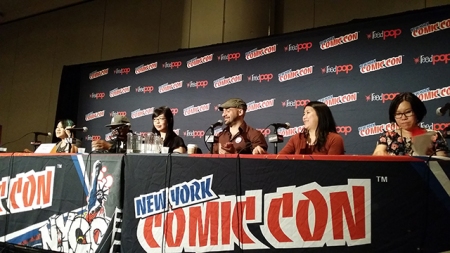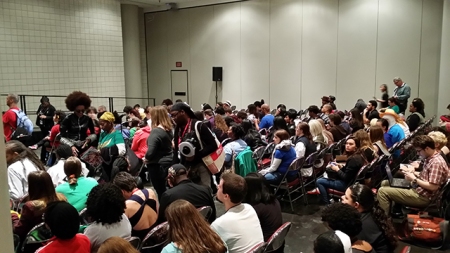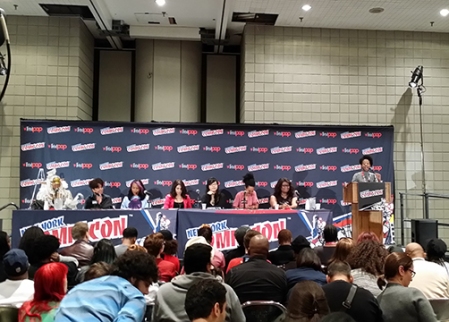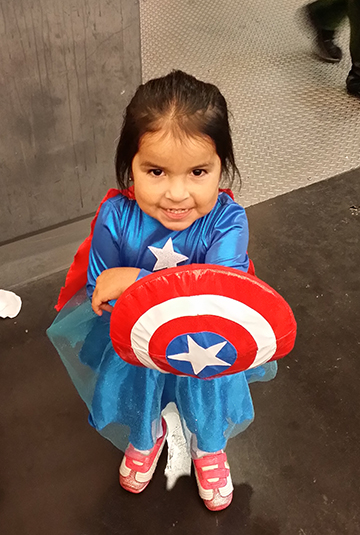 Stacy Whitman, Publisher of the Tu Books imprint of LEE & LOW BOOKS, gives us a recap of the 2014 New York Comic Con (NYCC) event and two big panels on diversity.
Stacy Whitman, Publisher of the Tu Books imprint of LEE & LOW BOOKS, gives us a recap of the 2014 New York Comic Con (NYCC) event and two big panels on diversity.
The #WeNeedDiverseBooks and #geeksofcolor hashtags were well represented at Comic Con this year, with three panels discussing diversity and several more panels where the subject came up. Publishers were showcasing their diverse titles among their frontlist promotions. And panels about diversity topics, even those held in large rooms at inconvenient times, were standing room only all weekend—a clear sign to me that this subject is on the minds of more and more people lately.
I missed the #WeNeedDiverse(Comic)Books panel, but you can see a recap of it here. Read on for recaps of the panels I attended:
Geeks of Color Go Pro panel
I arrived early, wanting to be able to get a good seat, and only two people were waiting in line—which made me nervous. Last year, the Geeks of Color panel was packed full. Would they repeat that this year the 8pm Thursday time slot, which admittedlywas less than ideal?
I needn’t have worried. Soon the room filled to capacity, perhaps 400-500 people, mostly people of color who were fans, interested in writing or illustrating themselves, or who had family members interested. Diana Pho, an editor at Tor, moderated the panel. Panelists were LeSean Thomas (BLACK DYNAMITE: THE ANIMATED SERIES; THE LEGEND OF KORRA; THE BOONDOCKS), Tracey J. John (MTV.com; Gameloft), Alice Meichi Li (Dark Horse), Daniel José Older (Author, HALF-RESSURECTION BLUES); and I. W. Gregorio (Author, #WeNeedDiverseBooks).

Most of the time was taken with each panelist sharing their story of how they went pro. Their answers for how they became an animator, a writer and editor, an illustrator, a video game writer, and a surgeon and writer were as diverse as the panelists themselves, showing how many paths there are to a professional creative career. For example, Boondocks and Legend of Korra animator LeSean Thomas grew up in the projects and never attended college, but instead got into comics because the materials to draw were pretty cheap, he said. He found opportunities when he showed his work to his boss at a sports store where he worked after high school, and learned as he worked his way up.
Daniel José Older, on the other hand, was a paramedic and antiracist organizer. Getting published took him six years. “The publishing industry will make you learn patience,” he said.
I.W. Gregorio wanted to become a writer but followed the path to becoming a doctor because that was what one did in her family. But one day, someone told her, “you’ll never become a writer,” and that, she said, ticked her off enough to want to prove them wrong. She also mentioned that her job as a surgeon makes her writing career possible and gives her stories to tell.
Others spoke of internships, art classes, balancing day jobs, getting master’s degrees, and community building.
Tracey John, when asked what she wished she knew when she began, said that she wished she had known to challege the status quo. Now, she’s more willing to ask tough questions, she said—such as “why does Princess Peach need saving?”
Older suggested that writers of color need to “reimagine what success means for each of us” and to build community “rather than think of it as networking.” For people who are getting started, he suggested to find people who are willing to ground you and challenge you.
Alice Meichi Li said that “you are an average of the five people you interact with most in your life,” so look for people who fit three categories: an older mentor, an equal, and someone you can mentor, because you learn a lot from teaching.
The big question of the night came from one of the last audience members to ask a question: Why are we still having this conversation? When will we not need a geeks of color panel at 8:00pm in the corner? Diana Pho replied that she thinks we’ll need such panels until we hit critical mass—not just at Comic Cons, but in all of pop culture, of people who believe diversity matters. We here at LEE & LOW agree with Older’s concluding remark: the more people speak up, the less circular the conversation will be, and we can push the conversation forward.
Women of Color in Comics panel
Friday was the Women of Color in Comics panel, which I was thrilled to see was an equally packed room. Moderated by Regine Sawyer of the Women in Comics Consortium, this panel also featured Alice Meichi Li (Dark Horse), Alitha Martinez (penciler and inker for Marvel), Jamila Rowser (Girl Gone Geek blog), Juliana ‘Jewels’ Smith (comics artist, (H)AFROCENTRIC), Barbara Brandon-Croft (cartoonist), Geisha Vi (cosplay model), and Vanessa Verduga (actor, writer, producer).


The moderator, Regine, started out by asking what drew the panelists to comics and how they got started. Again, a diverse range of answers—from family influence to students introducing their teacher to comics, to a natural desire to draw as a child—led to a diverse range of paths into their professional work.
The panel also discussed the ongoing harassment issue in comics as well as genre and gaming. Young women are the fastest growing demographic, changing the base of the comics industry. The panelists were asked how they address feminine issues in their work. Alice Meichi Li (who was on the Geeks of Color panel), said that she loved how panels such as these were getting bigger. She addresses feminine mythology, the heroine’s journey, in her work, and argued that visibility made all the difference for readers. She told a story of reading Wizard magazine growing up, where the list of top ten writers in the back of the magazine were all white guys every time, except occasionally Jim Lee. To be able to see all kinds of people creating comics helps create demand from more diverse readers.
Jamila Rowser from the Girl Gone Geek blog said that from a fan perspective, the changing face of the industry shows the demand and the need for representation of women, particularly accurate representation of women of color. “When you don’t see people like you doing things you love, it’s discouraging,” she said.
The panelists also spoke of how sometimes they might feel invisible in the industry—Alitha Martinez, who has worked at major comic book houses as an artist, including work on a Batman comic, said that she’d been mistaken for cleaning staff before when arriving for a panel or other major professional event. Vanessa Verduga mentioned that sometimes she feels an expectation to whitewash herself, to fit within an expected personality structure rather than to be herself.
When asked why diversity was important in the first place, Jamila Rowser answered that a lack of diversity can stop readers’ enjoyment, but it can also discourage future creators, and stories set in the future with no diversity “erase our presence in the future.”
Alitha Martinez noted that women of color can’t remain on the fringes, shouting from the outside. She said that women tend not to approach editors at Marvel and DC, and that those are the places where change needs to happen most because they’re the biggest. In addition, Alice Meichi Li said that if we want to see change, as readers, we need to support that change with our wallets. “Ignoring creations by women and people of color is ignoring community,” she said. “Find your audience, know your community, know how to speak to them, and create your own niche.”
Throughout the weekend, I saw a widely diverse audience excited about comic books, animation, science fiction, fantasy, and games. Cosplayers were in abundance, including people of color. Here are a couple of my favorites:
NYCC is a great example of why #WeNeedDiverseBooks, like those we publish!





Reblogged this on thewriterspanel and commented:
A great article, and very true. One day, hopefully, I’ll be able to contribute my thoughts (especially about diversity in literature) at NYCC!
Thank you so much for coming to the panel!I’m glad that you enjoyed it!